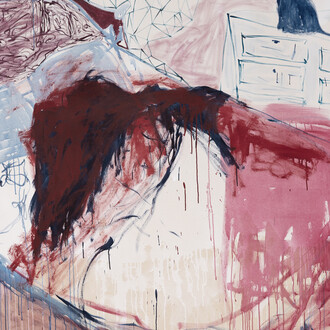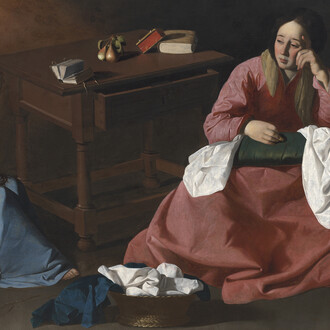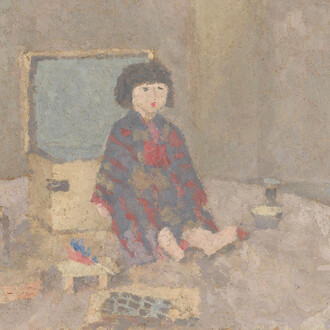Chalton Gallery is pleased to present the first solo show in London by Mexican artist Yoshua Okón: Future Shock.
The exhibition presents Yoshua Okón's early and latest film installations. Focusing on absurd political and social aspects of the North American region, the artist points to the interconnection of transnational phenomena, such as disproportionate consumption, rampant dispossession, and blind nationalism. Okón challenges the boundaries between artificiality and reality by using reenactment as narrative technique, in order to exasperate social dysfunctions. Experiencing this exhibition at Chalton Gallery as an installation of three moving image works, the visitor witnesses a non-linear world. The presented works lie between social performance and simulation, constantly enacting and re-enacting an uncertainty towards what is both seen and unseen. Future Shock i nvites the viewer to reflect on the consequences that post-truth politics has on reality. Clichés, forms of supremacy, and prejudices empower massive shifts in perception, opening up new worlds of domination that are continually reproducing themselves. How can we escape the shock of a world meltdown if not by overcoming the disconnection between the geopolitical micro and macro, present and future?
Installed in the main window of the gallery, the single channel video Freedom Fries: Still Life (2014) puts a spotlight on the dehumanization of the body, promoted though adverts and accelerated by food corporations. The artist invites a countermodel – a loyal customer of McDonald's– to strike a pose on the “fast food catwalk”, where daily consumers are invited to pursue their freedom in choosing their own diet and life style, while in fact trapped in a spiral of disproportionate consumption.
Drawing upon the laughter track patented by Charles Rolland Douglass, Yoshua Okón simulates a hallucinatory production in Canned Laughter (2009), a three channel video installation presented in the main room of the gallery. Conceived in response to his experience in Ciudad Juárez, the artist imagines the production of canned laughter for sitcoms in one of the most dystopian industrial realities of Mexico, the maquiladora. In this establishment promoted by the North American Free Trade Agreement (NAFTA) in 1994, the artist sets up a hilarious schizophrenia, alluding to globalised exploitation and the impossibility of reproducing authentic emotions through technology.
Adopting the fictional strategy of mise-en-scène, Yoshua Okón presents The Indian Project: Rebuilding History (2015), a single channel video installation in the back room of the gallery. Speaking an urgent voice on misrepresentations of “nationality”, this film focuses on the community of Skowhegan (Maine) originally called Milburn, but re-christened in the 19th century to what is thought to be its original Abenaki, Native American name. The area, where Skowhegan is located, was the site of some of the most atrocious acts against Native Americans, purging any authentic trace of their culture. In an attempt to attract tourists, the local community tried to resuscitate the spirit of indigenous times by erecting an 80 ft. tall Native American wooden sculpture and to re-brand the town itself upon a pretentious native heritage. Along with some invested inhabitants of Skowhegan, Yoshua Okón recreates a skewed approximation of a native ceremony. What happens when depictions such as these cross into reality? Clichés, forms of supremacy, and prejudices empower massive shifts in perception, opening up new worlds of domination that are continually reproducing themselves.
Yoshua Okón (Mexico City, 1970) is an artist based in Mexico City. His artistic research pivots on experiments executed for the camera blending staged situations, documentation, and improvisation, questioning conventional perceptions of reality, truth, selfhood and morality. In 1994, Yoshua Okón along with Miguel Calderón founded La Panadería in a former bakery. Until 2002, this project served Mexico City as a vibrant non-profit space for exhibitions, residencies, and cultural events involving local and international artists. In 2009, Yoshua Okón establishes SOMA along with artists such as Francis Alÿs, Teresa Margolles, Mario García Torres, and Julieta Aranda. It is conceived as a non-profit space, which comes directly from the tradition of La Panadería. SOMA is an organization aiming at nurturing discussion and exchange in the field of contemporary art and education in Mexico City. Its mission is to provide a forum for dialogue between artists, cultural producers, and the public at large. Yoshua Okón’s works have been featured in Manifesta11 (Zurich); Gwangju Biennale (South Korea), and included in the collections of Tate Modern, Hammer Museum, LACMA, Colección Jumex and MUAC, among others. Recent solo shows include Yoshua Okón: Collateral, MUAC, Mexico City; Yoshua Okón: In the Land of Ownership, Asakusa, Tokyo; Salò Island, UC Irvine, Irvine; Piovra, Kaufmann Repetto, Milan; Poulpe, Mor Charpentier, Paris; Octopus, Cornerhouse, Manchester and Hammer Museum, Los Angeles and SUBTITLE, Städtische Kunsthalle, Munich. Recent group shows include: Antes de la Resaca, MUAC, Mexico City; Incongruous, Musèe Cantonal des Beux-Arts, Lausanne; The Mole ́s Horizon, Palais des Beaux Arts, Brussels; Mercosur Biennial, Porto Alegre; Amateurs, CCA Wattis; San Francisco; Laughing in a Foreign Language, Hayward Gallery, London; Adaptive Behavior, New Museum, NY. Yoshua Okón studied at UCLA Los Angeles, graduating in 2002.
















